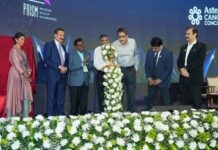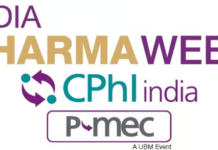New Delhi, January 20, 2017: “After 1971, this is the first expansive food composition data to be released having foods analyzed from across the country. India now joins the elite league of nations having its own complete food composition data base.” This was stated by Shri J P Nadda, Union Minister of Health and Family Welfare at the inauguration of the International Symposium on ‘Food Composition in Nutrition and Health, here today. Shri J P Nadda also released the new Indian Food Composition Tables (IFCT), a reference book for all kinds of nutritional evaluations including clinical practice for analyzing the diets of patients and devising special diets for them. Shri Faggan Singh Kulaste, Minister of State for Health and Family Welfare also graced the occasion.
Speaking on the occasion, Shri J P Nadda said that the comprehensive nutrient data bank will cater to the needs of researchers and policy makers for alleviating the nutritional deficiency and the associated disorders in the country. “Policy maker and researchers will also get good insights into what people are consuming in India, however we also need to explore how this scientific document will be used by the common man,” ShriNadda added. The Health Minister directed the officials to create a mobile app that can be used by everyone to enhance their well-being.
Congratulating the Indian Council of Medical Research (ICMR) and National Institute of Nutrition (NIN), Hyderabad for this exhaustive and comprehensive compilation of nutritional information on various Indian Foods, Shri Nadda said that all the ministries and government departments like women and child development, food processing, health, agriculture and planning will be able to reap the benefits of IFCT 2017. “I am sure that this database, with its precise and wide nutritional information of key foods consumed all across the country will help a great deal in cutting down inappropriate costs and inefficient use of food resources such that the target of attaining nutritional security of poor is achieved,” Shri Nadda elaborated.
The Indian national food sampling and analysis program was initiated by the Indian Council of Medical Research in 2011 in order to bring out a totally new “Indian Food Composition Tables” as an authoritative source of food composition data in India wherein key foods were prioritized and analyzed for a comprehensive set of nutrients at the National Institute of Nutrition (NIN), Hyderabad.
IFCT, popularly known as Nutritive Value of Indian Foods (NVIF) contains data which was sampled, analyzed and categorized on a massive scale after 45 years of long gap. The data enables to monitor food and nutrient availability in the country. It serves as a handbook for the dieticians, planners, medical & health professionals and students of nutrition field. It forms a basis for development of dietary guidelines, framing of food regulations & food safety, consumer education and educational materials. Food industry uses this data for labeling & nutrient claims, product development and reformulation. IFCT guides in planning of institutional diets, sports nutrition and food service industry.
To mark the release of this data, an International Symposium on “Food Composition in Nutrition and Health” is being organized at the same venue. The symposium will bring together various stakeholders and players using food composition tables for responding to new challenges and opportunities aimed at improving the nutrition situation in the country in a sustainable manner.
Also present at the function were Dr.Soumya Swaminathan, Secretary, Department of Health Research and Director General, ICMR, Shri A K Srivastava, Secretary, Ministry of Food Processing Industries, Shri Ashish Bahuguna, Chairman, Food Safety Standards Authority of India, Shri Trilochan Mohapatra, Secretary, Department of Agriculture Research and extension and DG ICAR,
Dr. Hameed Nuru, Country Director, WFP, Mr. Ruth Charrondiere, INFOODS Coordinator, FAO, Rome, eminent Scientists and other senior officers of the Ministry.





















